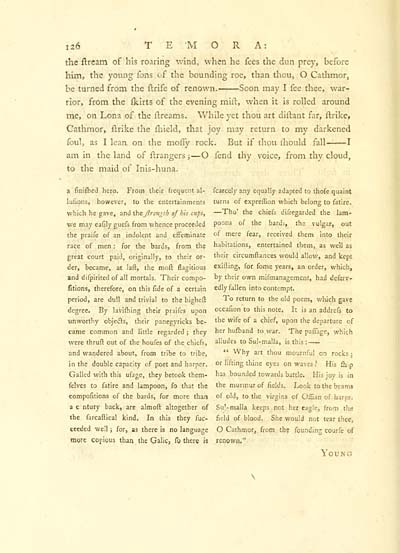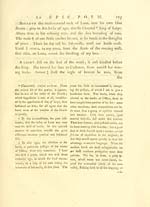Download files
Complete book:
Individual page:
Thumbnail gallery: Grid view | List view

126
T E 'M O R
the ftream of his roaring v,-ind, when he fees the dun prey, before
him, the young fons of the bounding roe, than thou, O Cathmor,
be turned from the flrife of renown.' Soon may I fee thee, war-
rior, from the fkirts of the evening mifl:, when it is rolled around
me, on Lona of the ftreams. While yet thou art diftant far, ftrike,
Cathmor, flrike the fliield, that joy may return to my darkened
foul, as I lean on the moffy rock. But if thou fliould fall 1
am in the land of ftrangers ; — O fend thy voice, from thy cloud,
to the maid of Inis-huna.
a finifhed hero. From their frequent al-
lufions, however, to the entertainments
which he gave, and xhsjlren^th of his cups,
we may eafily guefs from whence proceeded
the praife of an indolent and effeminate
race of men : for the bards, from the
great court paid, originally, to their or-
der, became, at Jaft, the mod flagitious
and difpirited of all mortals. Their compo-
fitions, therefore, on this fide of a certain
period, are dull and trivial to the higheft
degree. By lavifbing their praifes upon
unworthy objefts, their panegyricks be-
came common and little regarded ; they
%vcre thruft out of the houfes of the chiefs,
and wandered about, from tribe to tribe,
in the double capacity of poet and harper.
Galled with this ufage, they betook them-
felves to fatire and lampoon, fo that the
compofitions of the bards, for more than
a c ntury back, are almoft altogether of
the farcaftical kind. In this they fuc-
ceeded well ; for, as there is no language
more copious than the Galic, fo there is
fcarccly any equally adapted to thofe quaint
turns of expreffion which belong to fatire.
— Tho' the chiefs difregarded the lam-
poons of the bards, the vulgar, out
of mere fear, received them into their
habitations, entertained them, as well as
their circumflances would allow, and kept
exifling, for fome years, an order, which,
by their own mifmanagemcnt, had deferv-
edly fallen into contempt.
To return to the old poem, which gave
occafion to this note. It is an addrefs to
the wife of a chief, upon the departure of
her hufband to war. The paflage, which
alludes to Sul-malla, is this :
" Why art thou mournful on rocks;
or lifting thine eyes on waves I His fhip
has bounded towards battle. His joy is in
the murmur of fields. Look to the beams
of old, to the virgins of Offian of harps.
Su'-malla keeps not her eagle, from tlie
field of blood. She would not tear thee,
O Cathmor, from the founding courfe of
renown."
Young
T E 'M O R
the ftream of his roaring v,-ind, when he fees the dun prey, before
him, the young fons of the bounding roe, than thou, O Cathmor,
be turned from the flrife of renown.' Soon may I fee thee, war-
rior, from the fkirts of the evening mifl:, when it is rolled around
me, on Lona of the ftreams. While yet thou art diftant far, ftrike,
Cathmor, flrike the fliield, that joy may return to my darkened
foul, as I lean on the moffy rock. But if thou fliould fall 1
am in the land of ftrangers ; — O fend thy voice, from thy cloud,
to the maid of Inis-huna.
a finifhed hero. From their frequent al-
lufions, however, to the entertainments
which he gave, and xhsjlren^th of his cups,
we may eafily guefs from whence proceeded
the praife of an indolent and effeminate
race of men : for the bards, from the
great court paid, originally, to their or-
der, became, at Jaft, the mod flagitious
and difpirited of all mortals. Their compo-
fitions, therefore, on this fide of a certain
period, are dull and trivial to the higheft
degree. By lavifbing their praifes upon
unworthy objefts, their panegyricks be-
came common and little regarded ; they
%vcre thruft out of the houfes of the chiefs,
and wandered about, from tribe to tribe,
in the double capacity of poet and harper.
Galled with this ufage, they betook them-
felves to fatire and lampoon, fo that the
compofitions of the bards, for more than
a c ntury back, are almoft altogether of
the farcaftical kind. In this they fuc-
ceeded well ; for, as there is no language
more copious than the Galic, fo there is
fcarccly any equally adapted to thofe quaint
turns of expreffion which belong to fatire.
— Tho' the chiefs difregarded the lam-
poons of the bards, the vulgar, out
of mere fear, received them into their
habitations, entertained them, as well as
their circumflances would allow, and kept
exifling, for fome years, an order, which,
by their own mifmanagemcnt, had deferv-
edly fallen into contempt.
To return to the old poem, which gave
occafion to this note. It is an addrefs to
the wife of a chief, upon the departure of
her hufband to war. The paflage, which
alludes to Sul-malla, is this :
" Why art thou mournful on rocks;
or lifting thine eyes on waves I His fhip
has bounded towards battle. His joy is in
the murmur of fields. Look to the beams
of old, to the virgins of Offian of harps.
Su'-malla keeps not her eagle, from tlie
field of blood. She would not tear thee,
O Cathmor, from the founding courfe of
renown."
Young
Set display mode to: Large image | Transcription
Images and transcriptions on this page, including medium image downloads, may be used under the Creative Commons Attribution 4.0 International Licence unless otherwise stated. ![]()
| Early Gaelic Book Collections > Ossian Collection > Temora, an ancient epic poem, in eight books > (138) |
|---|
| Permanent URL | https://digital.nls.uk/82194955 |
|---|
| Description | Selected books from the Ossian Collection of 327 volumes, originally assembled by J. Norman Methven of Perth. Different editions and translations of James MacPherson's epic poem 'Ossian', some with a map of the 'Kingdom of Connor'. Also secondary material relating to Ossianic poetry and the Ossian controversy. |
|---|
| Description | Selected items from five 'Special and Named Printed Collections'. Includes books in Gaelic and other Celtic languages, works about the Gaels, their languages, literature, culture and history. |
|---|

